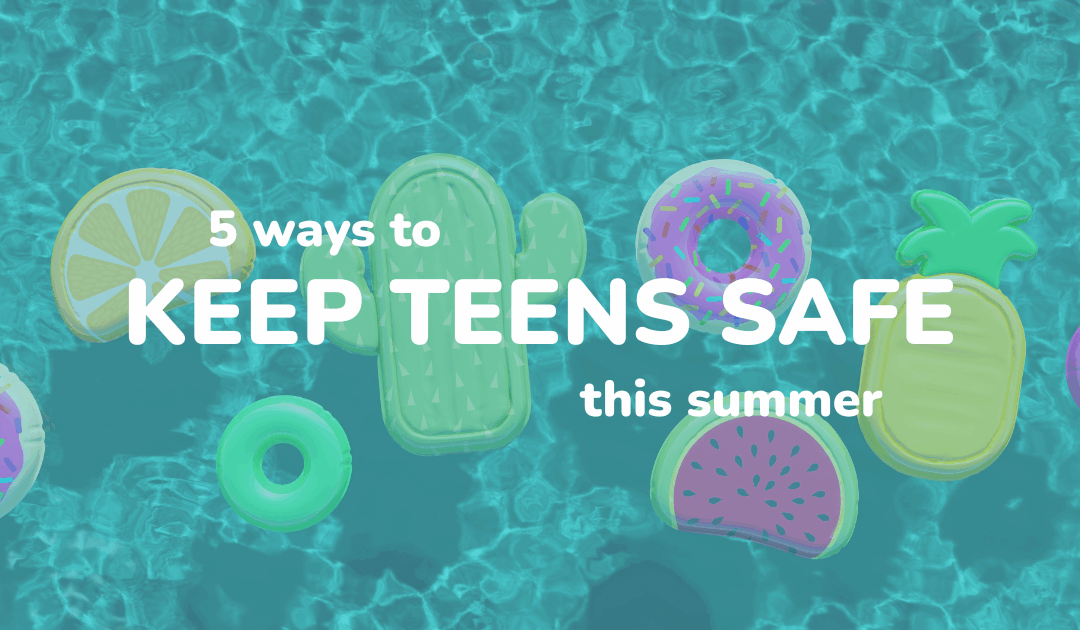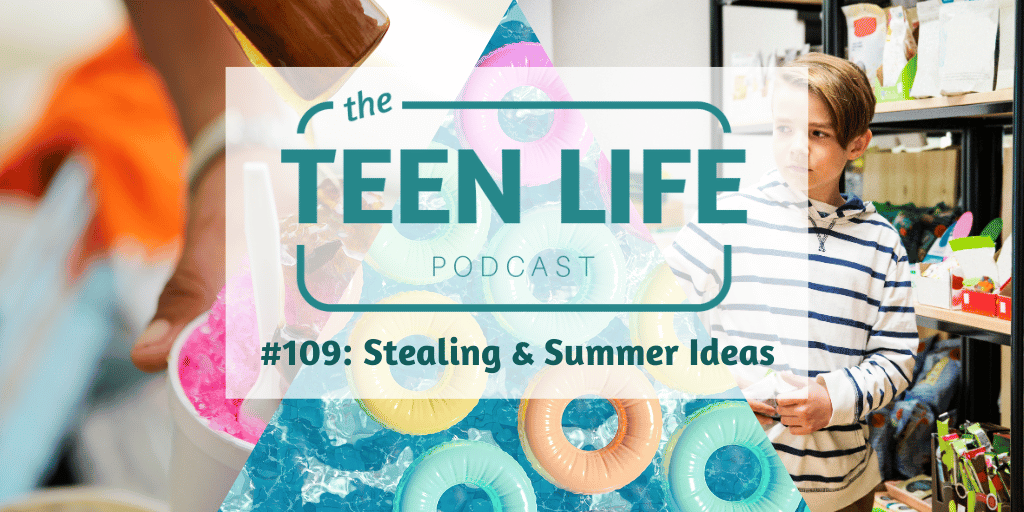Chris: Welcome to the Teen Life Podcast where we believe that teenagers are not a problem to be solved. We’re here to help you equip teenagers through the power of connection.
Hey guys, this is Chris Robey, and over across from me is Karlie Duke.
Karlie: Hi Chris!
Chris: Hey! So today, we’re going to talk about a topic that is, um, it’s really interesting because we hear about this a lot in our groups, and it’s the topic of stealing, which, um, you know, we can’t really incriminate ourselves, I don’t. But I don’t know that I’ve really ever stolen anything before, like intentionally. Maybe. I don’t know. But, um, I do know this is a big topic, especially within teenagers. We talk about risk-taking, we talk about um, behaviors that come with adolescence a lot, and uh, stealing is one of those that you will see come across.
Karlie: Yeah, definitely. I was just telling Chris, it’s actually pretty hard to find stats on this, and probably because a lot of them don’t get caught. And you’re right, I was trying to think if I’ve ever stolen something, maybe like as a little kid I might have stolen something, and I remember that being a huge deal in my family. And then like every now and then I’ll like get home, one time I got home and I had a spoon from a restaurant in my purse, and I was like, where did that come from? Like how did that get… I’m sure I just dropped it and it happened to fall in. Josh was like, I can’t believe you stole that spoon, and I was like, I promise that was not intentional. But there’s obviously a difference between like unintentionally taking something or walking out and not meaning to and shoplifting.
Chris: I will say, there have been times that I will walk out of a store and think, like, did I put something in my pocket? Because I mean, you think about walking around and just your hands are in and out of your pockets, you’re looking at things, like, like, is around the house, I’ll pick something up and put it in my pocket and leave, and I’ve always worried about that. Like, because as I drift off so easy, I’m in my own head, I’m kind of wandering around, I’m like, like one of these days I’m gonna walk out with something and not even realize I did it, which has been a great story, right?
Karlie: Yeah. I will say when I was a teenager- and these are little- but still would be considered stealing and not okay, it was very cool to take Whataburger tent numbers. If you know the little orange tents, especially if it was like your number for Sports or whatever, people would take those a lot. And then remember Chili’s used to have the like potholders on their queso that had like the Chili Peppers on them and that was a thing. I don’t think I had one, but I had friends that would take those and then put them on like their gear shifts in their car, And they would like just because it was an easy thing to stick in your pocket, stick in your purse, stick in your bag, and so like I said,
Chris: That’s why you don’t see them anymore.
Karlie: Now that’s why. Exactly, exactly, you don’t see them because um… um, that was a thing for a little while, at least around me.
But shoplifting remains one of the most frequent crimes committed by adults and teenagers, and I did find one stat that said one in four youth admit to having shoplifted between the ages of 12 to 16. That makes sense, yeah, so about 25%. But I saw that shoplifters say they are caught on average just once every 49 times they steal. So that is not very often, at least I wouldn’t think so.
And, um, then 79% of criminal justice professionals surveyed say that shoplifting is a gateway to more costly and violent crime, so almost like it would be the gateway drug to crime. It might start small, but then if you get away with stealing candy, then you might feel emboldened to steal something bigger and bigger and bigger, and then it can get you into other things as well.
And then finally, the last stat that I have is a third of teenagers who have been caught shoplifting say it’s difficult for them to quit.
Chris: Hmm, I wonder why that is.
Karlie: Yeah, and like I said, I almost wonder if it’s something like it becomes an addiction. Like you get that thrill, that risk-taking of ‘I got away with something,’ and then you keep going or you like the feeling when you do it, and then it’s very difficult to give up, even if you get caught.
Chris: Makes sense.
Karlie: But I would like to at least hit on maybe what’s behind this behavior, because I do think it’s not always just like a teen looking for trouble. It could be, but it could also be other things.
So it could be a need for attention, especially if they are stealing from you or a loved one. So if you have a teenager who’s taking your things in your house or like at school, maybe they are trying to get attention, and that’s a way of like, ‘Hey, you value this more than me, so I’m going to take it from you.’
Chris: Makes sense.
Karlie: Now, it could also be expressing anger. Like I said, this one too, if you’re stealing from a loved one or if something happened in a store that they feel like they were victimized, maybe they could steal out of anger to get back at that person. It could just be a lack of self-control.
Chris: Yeah
Karlie: It could be peer pressure. Maybe they’re with a group of friends, and that’s what they all do, and so you feel like you have to do it. Maybe in that kind of silly example, but like the Chili’s hot pad, if everyone’s doing it and they’re like, ‘Come on, it’s your turn, you have to do it,’ you might feel pressured to do that.
Chris: You don’t have a hot pad on your gear shifter, I feel like I’m being left out.
Karlie: It could also be rebellion.
And then finally, maybe to get things that parents won’t buy them or give them money for. So, it could be name brand clothing, it could be alcohol, it could be vape pens, you know, something that maybe they’re underage or they’re like, ‘My parents won’t let me do this, so I’m just going to take it from them,’ or maybe they take the money, they steal the money, and then use that to go buy the things that they want.
Chris: Well, you can really see how the reasons behind it or if they allude to it, maybe more so of like, you know, or try to, you know, it’s this is a relatively common thing with teenagers, especially kids from hard places who don’t have resources. This is a pretty easy go-to for them.
Karlie: Yes, it is. Something I do want to mention because it’s something I saw as I was doing my research is that kids who repeatedly steal might have trouble trusting others.
Chris: They also might have trouble forming close relationships. And sometimes instead of feeling guilty or ashamed, there might be something behind that that is causing trust issues, that’s causing them to act out in that way. And they might benefit from talking to someone.
Karlie: Right, so something to think about. I also want to mention kleptomania is something that I feel like we sometimes hear about, but this is a very rare compulsive disorder, and it makes up a very small percentage of shoplifting cases. But that would be like, “I can’t stop myself, I have to take things.” But there is something to, like if you have a child or know a teenager who steals, as adults, first of all, is maybe trying to figure out what’s behind the stealing. Is it that they don’t have money? Is it that they’re mad about something? Are they trying to get attention? That is really key to figuring out then how to handle it. If you know what’s behind it, and so that would be my first step.
But I also think it’s important to talk about why stealing is wrong and the consequences, because there can be some pretty big consequences. And we don’t want to lecture necessarily, but even sweep this into the rug, but like, let’s talk about what we can do to make it better, maybe.
Chris: I think especially if it’s something small, nice package or whatever, like it’s easy just to split that slide. But um, realizing that you know, no matter the size of it, it’s, you know, we don’t steal.
Karlie: Exactly like I said, we don’t want to lecture, we don’t want to predict future bad behavior of if they stole one time, you’re going to become a criminal and you’re gonna go down this path, and you don’t. So, I think when you talk to them about it, then maybe it’s like, okay, maybe we should talk to someone about this and get some help. And then finally, if you’ve talked about it, if you’ve addressed it, if there’s been kind of a follow-up on like, how can we make this better? Our advice is to drop it and let’s begin again with a clean slate. And then you can have a different conversation if it comes up and it happens again. But I think it’s important to not just continue to every time you see your teenager, because early on if they identify themselves as someone who steals, um, you know, that that tends to stick emotionally that “I’m a thief” um, and bad things follow that.
Chris: It is a gateway. And so, after it has been addressed, I think dropping it and, you know, making sure you keep an eye, but you don’t keep bringing it up over and over again so they can move on from the mistake.
Karlie: Hmm, for the trend this week, Chris, we are coming up on summer. It’s here, which is the best time. I know, it seems wild, and we did a post of things like, how do you keep them busy? How do you keep them engaged? How do we stay, uh, off of video games and off the TV for the whole summer?
I think this is super helpful to talk about this. So, the first thing I mention this is because depending on what it is, this could take up a significant chunk of their summer and give them something to do. So, if you said like, “Hey, what is something you’ve always wanted to learn and you’ve never had time for it? Let’s do it this summer, let’s make sure it is fun, but also is giving them a skill over the summer.”
And there is, I mean, there’s no reason that anyone can’t do this, uh, you know, there are so many resources on the internet. I mean, this free is YouTube, something. Um, I like my kids over a couple summers learn how to draw something, the little Google “how to draw a cat” or whatever, and they’ll just step by step, literally, people who will teach you step by step how to draw something. There’s a lot of fulfillment from that. Um, so that’s a really, that’s t like have them make a chart and have them make a map, and then you can rank them and come up with a scale and kind of make it a kind of a little bit of a game over the summer. I have a friend who does a version of this where they eat different kinds of Thai food, and I’m not huge on Thai food, but one of the things about Thai food is everywhere you go, they’ve got, you know, a basically a hotness scale from one to four or one to five, right? But they, they’ll, they will rate them between restaurants be, same thing, and I mean, I just think something like that would be fun, and it kind of gets them into, like, “Alright, you’ve got to research it and plan it and help us figure out where we’re going to get them something to look forward to.”
Now, getting a job or offering a service is also helpful because it is something that will hopefully make them some money. It’ll take up some time, it’ll also get them off the couch or out of their video game chair, out of bed in the morning. So, I would think, because I let the dogs out twice a day, something like that is easy, and then I just love snow cone stands, are like that is a summer staple that’s only open for the summer that you can encourage your teenager to work at.
And then finally, I think part of the job of our teenagers and, you, honestly, for the summer is to relax. Yeah, to take some time. And so, I don’t want, we’re giving you ideas on things to do to get them moving, but at the same time, they deserve a break, right? So, maybe that’s hanging out by the pool, – it’s what brings health. And so, yeah, we can play video games where we can watch YouTube or be on our phones, but we need to make sure that’s not all we do.
Chris: That’s not the definition of relaxing, that it’s, uh, that’s checking out.
Karlie: And so, um, the act of relaxation, of just hanging out together, being with people, sharpening your mind, um, is really helpful. And making sure that you are able to define what’s what, um, can help your student rejuvenate over the summer.
Karlie: For our tip this week, I want to preview our summer series. Me, Chris, or Tobin, our program director will be on them. But we’re going to look at a behavior, like, for example, next week we kick it off with perfectionism, and we’re going to look at that behavior and we’re going to look at what’s behind it. We’re going to give you our questions to ask, we’re going to give you some tips on how to connect with your teenager through that, and then we’re even going to reframe it and maybe give a perspective change on that behavior because some things aren’t always all weird.
Chris: When we train facilitators to go and run support groups, one of the things that one of the sections of our training is what we call difficult group behaviors, and it’s really interesting every time we train on that. It all, it feels like people lean in and start taking notes because as adults working with students, it could be a little bit intimidating to deal with more problem behaviors.
Karlie: And so, that kind of tips us out like people, people want to know about this. And so, this, while this isn’t to do, um, these are shorter episodes. And so, I know we’re busy over the summer and there’s a lot of things going on, but we really encourage you to check in on those as they drop every single week.
Chris: And those will start next week, and we’d love to hear your feedback. And if you have ideas for more behaviors that we can catch up on past the summer, we’d love to hear that too.
But with that, Carly, we’re gonna wrap this episode up. Uh, we are so glad that you continue to listen and support the Teen Life Podcast. We’ll see you with the summer series next week.





















